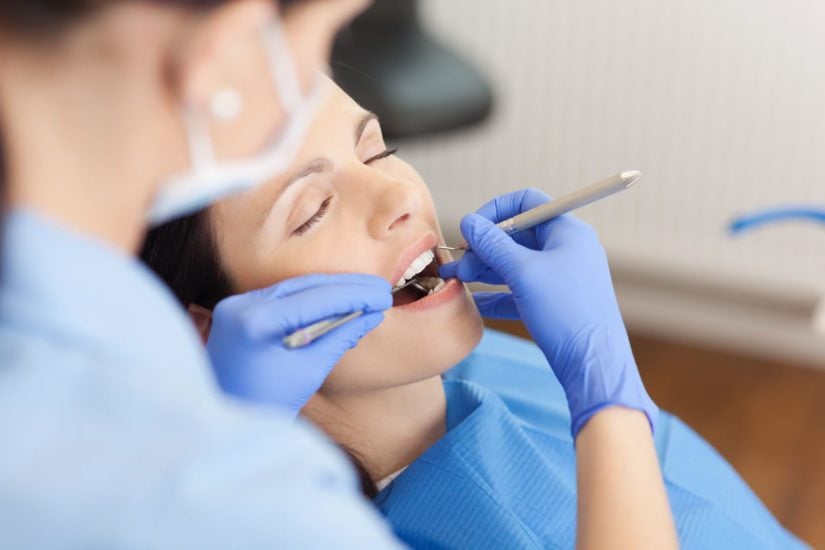
Even though we all know that going to the dentist is beneficial, some of us drag our feet more than others. If you have severe symptoms of anxiety (e.g. crying, trouble sleeping, physically feeling ill before an exam, etc.), it may be wise to at least explore sedation dentistry:
Is Sedation Dentistry Right for you?
With sedation, the dentist administers a drug before or during the dental procedure. Only one type — general anesthesia — renders the patient completely unconscious. The other forms will relax you, but won’t knock you out completely.
The most common types of sedation dentistry include the following:
- Nitrous oxide: A gas that relaxes you during the procedure. It wears off quickly, so your dentist might let you drive yourself home after the appointment.
- Oral sedatives: Oral sedatives, such as diazepam, also help relax patients during dental procedures. You typically take them an hour or so before your appointment. You’re fully awake but less anxious, and you might feel a little sleepy until it wears off.
- Intravenous sedatives: Intravenous, or IV, sedatives can put you in varying stages of consciousness. This is also known as general anesthesia and, as mentioned above, will put you into a deep sleep until it wears off. Other IV drugs, however, can put you into a “twilight sleep.” You’re less aware of your surroundings, you might feel sleepy, and you might not remember much of the procedure once it’s over.
Some patients assume that general anesthesia offers the best solution. However, it also comes with more potential side effects than the other methods, so you might want to consider a lesser form of sedation dentistry. If your dental care provider mentions sleep dentistry, he or she likely means general anesthesia.
You might prefer dental sedation or sleep dentistry, but talk to your dentist about it first. Mention any allergic reactions you’ve experienced in the past, especially to anesthesia, so your dental professional can make safe, educated recommendations.
As you can see the caveat is that, like any other medication, there could be side effects that are unpleasant. So if you are able to try and work through your phobias first before trying sedation, that may be ideal. And as 123dentist.com says, if you've had an allergic reactions from past operations, then again, sedation may not be viable unless you take a milder form.
The good news is that you've got options. Not only can you choose between the previously mentioned methods (oral drugs, IV, etc.), but you and your doctor can find talk about which anesthetics have generally been preferred by previous patients. A study found at drbicuspid.com goes into this concept a little more:
Which Dental Anesthetic Do Patients Prefer?
Every practitioner has a preference for which anesthetic to use for adult patients with severe dental anxiety. But, of sevoflurane or propofol, which do patients prefer?
"We, therefore, performed a crossover study to determine which was more preferable for ambulatory anesthesia between propofol and sevoflurane based on the comparison of the recovery profile and patient satisfaction after anesthesia," Keita Ohkushi, DDS, PhD, and co-authors wrote.
Dr. Ohkushi is an assistant professor in the department of dental anesthesiology at the Tokyo Dental College.
Fatigue cited
Every office has adult patients who are severely anxious at the thought of treatment. These patients sometimes need to be anesthetized for treatment to occur. So researchers from Japan wanted to see which anesthetic patients preferred for ambulatory anesthesia: propofol alone or sevoflurane alone. Both are currently used for ambulatory anesthesia, and patients emerge rapidly after discontinuation.
“Propofol may be more suitable for ambulatory anesthesia for dental treatment.”
— Keita Ohkushi, DDS, PhD, and co-authorsThe study included 20 adult patients with severe dental anxiety who needed at least two dental treatments. All patients received both propofol and sevoflurane in this study, allowing for a direct comparison. No coadministered drugs were used.
Anesthesia was induced with propofol (1% Diprivan injection kit, AstraZeneca) with predicted effect site concentration at 3.5 μg/mL in the patients who received propofol. In the sevoflurane group, anesthesia was induced with 3% sevoflurane (Sevofrane, Abbott Japan) using a face mask with supplemental oxygen at 6 L/min.
The effect site concentration of propofol and inhaled concentration of sevoflurane were adjusted to maintain bispectral index monitoring (BIS) value at 40 to 60 under inhalation of oxygen at 1 L/min and air at 3 L/min. Patient observation was done in the emergence phase, the recovery phase, and 24 hours after discharge.
The authors reported that time to emergence was shorter with sevoflurane anesthesia than with propofol anesthesia, but they found no difference in time to full recovery.
No participants in the propofol group reported nausea or vomiting during the recovery phase, while three of 20 in the sevoflurane group did. The average time to discharge was slightly faster for the propofol group (169 ± 45 minutes compared with 176 ± 48 minutes). The authors also reported no differences between the groups in time to first meal or fluid, on telephone follow-up about 24 hours afterward.
When asked on follow-up about satisfaction and preference, the 16 patients said they would choose propofol, and four said they would choose sevoflurane in the future . . .
Before you make an appointment with your dentist, call the office first so that you can explain your situation. Dentists are very familiar with people's fears and can discuss options with you first. You can find out more at myimagedental.com/services/preventive-dentistry/.
The article Dentists Understand Dental Phobias and Have Tools To Help is republished from: http://www.myimagedental.com/
Image Dental
3453 Brookside Road, Suite A
Stockton, CA 95219
(209) 955-1500
email@myimagedental.com
Google My Business Listing
Google Map
Directions to our office
Yelp Page

No comments:
Post a Comment